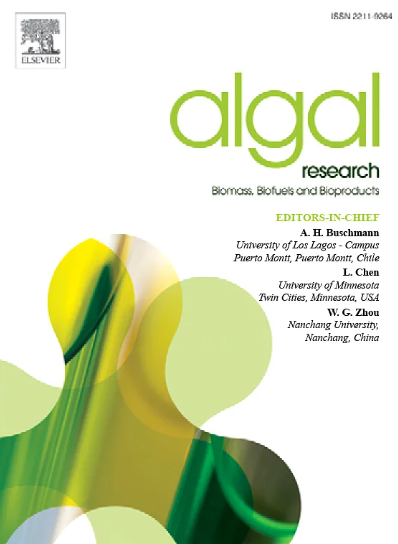Improving soil structure and function for continuous cropping of sweet melon using microalgae-based biological fertilizer
IF 4.6
2区 生物学
Q1 BIOTECHNOLOGY & APPLIED MICROBIOLOGY
Algal Research-Biomass Biofuels and Bioproducts
Pub Date : 2025-01-01
DOI:10.1016/j.algal.2024.103868
引用次数: 0
Abstract
Melon occupies an important position in fruits and vegetables production and consumption in China for its rich nutrient content. However, continuous cultivation of melons is characterized by disorders such as soil nutrient reduction and microbial community imbalance. This paper was the first to investigate the effects of algae-based biofertilizers (Chlorella vulgaris and shell powder, TQB; Chlorella vulgaris and straw fermentation liquid, TQJ; and Chlorella vulgaris and Bacillus sphaericus, TQY) on the physicochemical characteristics and microbial community structure of the soil for potted continuous-cropped melons. The results showed that, compared with the control group (with water only, TC), the three algae-based biofertilizers substantially increased the important elements of carbon (C), nitrogen (N), sodium (Na), and potassium (K) in melon soil. The algae-based fertilizer TQY had the greatest impact, increasing the ammonia nitrogen (NH4+-N) content by 437.5 %. Also, the salinity indexes, Na+ and K+, were enhanced by 416.7 % and 45 % respectively. Notably, the application of algae-based biofertilizer was found to increase the abundance of beneficial bacteria such as Chloroflexi and Firmicutes, and reduce the fungi, further improve the adverse factors caused by continuous cropping obstacles of sweet melon. This study would provide technical support for soil improvement to enhance the continuous growth and quality of melon production.

求助全文
约1分钟内获得全文
求助全文
来源期刊

Algal Research-Biomass Biofuels and Bioproducts
BIOTECHNOLOGY & APPLIED MICROBIOLOGY-
CiteScore
9.40
自引率
7.80%
发文量
332
期刊介绍:
Algal Research is an international phycology journal covering all areas of emerging technologies in algae biology, biomass production, cultivation, harvesting, extraction, bioproducts, biorefinery, engineering, and econometrics. Algae is defined to include cyanobacteria, microalgae, and protists and symbionts of interest in biotechnology. The journal publishes original research and reviews for the following scope: algal biology, including but not exclusive to: phylogeny, biodiversity, molecular traits, metabolic regulation, and genetic engineering, algal cultivation, e.g. phototrophic systems, heterotrophic systems, and mixotrophic systems, algal harvesting and extraction systems, biotechnology to convert algal biomass and components into biofuels and bioproducts, e.g., nutraceuticals, pharmaceuticals, animal feed, plastics, etc. algal products and their economic assessment
 求助内容:
求助内容: 应助结果提醒方式:
应助结果提醒方式:


